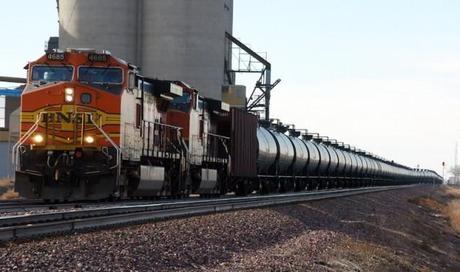by Tom Kenworthy / Think Progress

Rail line congestion caused by the oil boom in the Bakken shale oil field of North Dakota and Montana is creating huge backlogs for farmers anxious to get wheat, soybeans, sugar beets, and other crops to markets, and it’s driving large production losses for big food companies like General Mills and Cargill.
“This rail backlog is a national problem,” Sen. Heidi Heitkamp (D-ND) told the New York Times. “The inability of farmers to get these grains to market is not only a problem for agriculture, but for companies that produce cereals, breads and other goods.”
A study conducted by North Dakota State University at the request of Sen. Heitkamp found that farmers could lose more than $160 million in revenue because of crowded rail lines.
The booming production of oil from the Bakken field has meant a huge increase in shipments by rail because the region is not well served by pipelines. About 75 percent of the Bakken production is shipped by rail, including about 400,000 barrels a day to the East Coast.
Last winter, heavy oil train traffic caused problems for passenger traffic in the Upper Midwest. And it’s not just oil that may cause problems down the road, but coal shipments as well, as a recent study predicted if exports of Wyoming and Montana coal from the West Coast grow.
For a long time, rail has been the most efficient way for farmers in the nation’s bread basket to move their crops, including to ports on the east and west coasts for export to Europe and Asia.
But according to the New York Times, the Burlington Northern Santa Fe Railway as of Aug. 22 had a backlog of 1,336 rail cars needed to carry agricultural products. The Canadian Pacific Railroad had a backlog of almost 1,000 cars.
The delays are hitting farmers in the pocketbook, and hard.
“If we can’t get this stuff out soon, a lot of it is simply going to go on the ground and rot,” Casselton, ND farmer Bill Hejl told the newspaper. “they need to get this problem fixed. I’m losing money, and my customers are turning to other sources as a result. I don’t know how much longer we can survive like this.”

